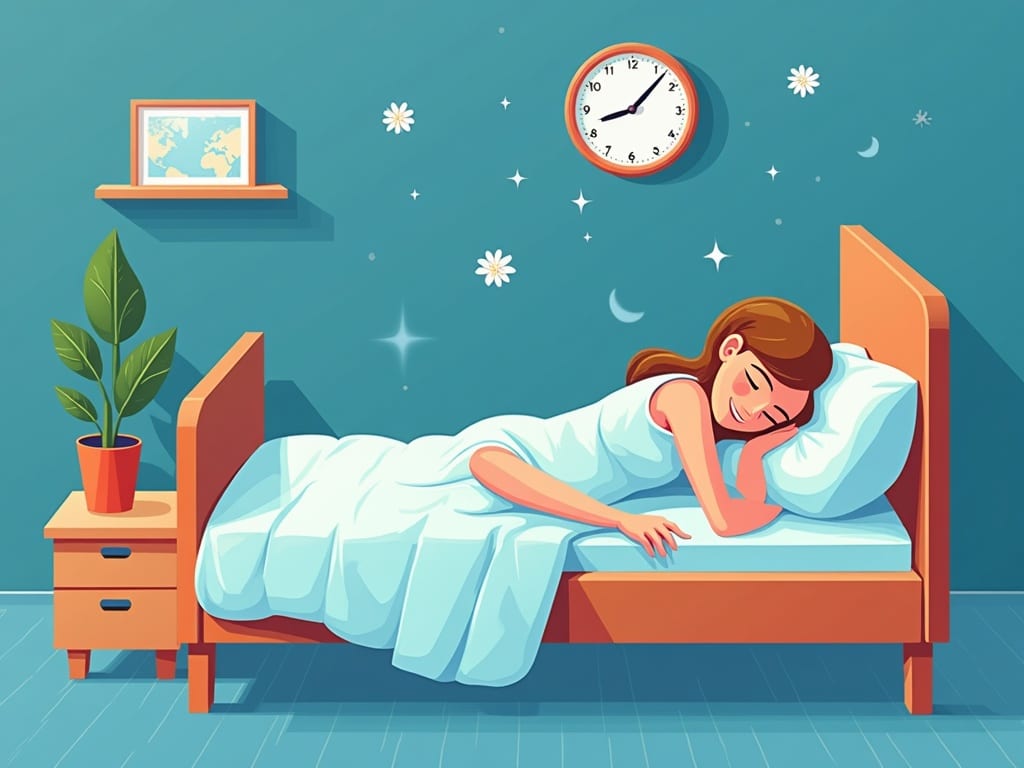How Much Sleep Do You Need to Lose Weight? Unlocking the Power of Rest
Imagine this: You're diligently hitting the gym, meticulously tracking your calories, and yet, the scale stubbornly refuses to budge. Could the missing piece of the puzzle be something as simple as sleep? While it might seem counterintuitive, the amount of sleep you get plays a crucial role in weight management. This isn't just about feeling refreshed; it's about optimizing your hormones, metabolism, and overall ability to shed those extra pounds. Let's dive into the fascinating connection between sleep and weight loss, exploring exactly how much sleep you need to lose weight effectively.
The Sleep-Weight Loss Connection: More Than Just Feeling Tired
Sleep deprivation does more than leave you feeling groggy. It throws your body into a state of physiological stress, triggering a cascade of hormonal imbalances that can sabotage your weight loss efforts. Here's a breakdown of the key players:
- Ghrelin and Leptin: The Hunger Hormones: Ghrelin, the hunger hormone, increases when you're sleep-deprived, signaling your brain to crave food. Meanwhile, leptin, the satiety hormone, decreases, making it harder to feel full and satisfied after eating. This dangerous combination leads to increased appetite and calorie consumption.
- Cortisol: The Stress Hormone: Lack of sleep elevates cortisol levels. Chronically elevated cortisol can promote fat storage, particularly around the abdominal area, and can also break down muscle mass, hindering your metabolism.
- Insulin Sensitivity: Sleep deprivation reduces insulin sensitivity, meaning your body needs to produce more insulin to regulate blood sugar levels. This can lead to insulin resistance, a precursor to type 2 diabetes, and also encourages the body to store fat rather than burn it.
In essence, skimping on sleep transforms your body into a fat-storing machine. It's not just about willpower; it's about the powerful hormonal forces working against you when you're running on empty.
How Much Sleep is Enough? Finding Your Sweet Spot
While the old adage of eight hours a night is a good starting point, the optimal amount of sleep varies from person to person. Most adults need between 7 and 9 hours of quality sleep per night to function optimally and support healthy weight management. However, factors like age, genetics, lifestyle, and underlying health conditions can influence your individual sleep needs.
Here's a general guideline:
- Adults (26-64 years): 7-9 hours
- Older Adults (65+ years): 7-8 hours
It's important to note that simply being in bed for 8 hours doesn't guarantee quality sleep. The goal is to achieve restorative sleep characterized by minimal interruptions and sufficient time spent in the deeper stages of sleep.
The Science Behind the Numbers: Studies on Sleep and Weight Loss
Numerous studies have highlighted the link between sleep and weight loss. Here are a few key findings:
- Reduced Calorie Intake: Research has shown that people who get enough sleep tend to consume fewer calories throughout the day. This is likely due to the improved regulation of hunger hormones, leading to better appetite control.
- Increased Fat Loss: A study published in the Annals of Internal Medicine found that dieters who slept 8.5 hours per night lost more fat and less muscle compared to those who slept 5.5 hours. This suggests that adequate sleep helps preserve lean muscle mass during weight loss, which is crucial for maintaining a healthy metabolism.
- Improved Exercise Performance: Sleep deprivation can impair physical performance, making it harder to stick to your workout routine. Getting enough sleep can improve your energy levels, motivation, and overall athletic ability, leading to more effective workouts.
These studies provide compelling evidence that prioritizing sleep can significantly enhance your weight loss efforts.
Beyond Quantity: The Importance of Sleep Quality
Getting enough hours of sleep is just one piece of the puzzle. The quality of your sleep is equally important. Factors that can affect sleep quality include:
- Sleep Apnea: A condition characterized by pauses in breathing during sleep, disrupting sleep cycles and reducing oxygen levels.
- Insomnia: Difficulty falling asleep or staying asleep.
- Restless Legs Syndrome: An irresistible urge to move your legs, often accompanied by uncomfortable sensations.
- Poor Sleep Environment: A noisy, bright, or uncomfortable bedroom.
- Stress and Anxiety: Racing thoughts and worries can interfere with sleep.
Addressing any underlying sleep disorders or making lifestyle changes to improve your sleep environment can significantly enhance your sleep quality and, in turn, support your weight loss goals.

Practical Tips for Prioritizing Sleep and Boosting Weight Loss
Ready to harness the power of sleep for weight loss? Here are some practical tips to help you improve your sleep habits:
- Establish a Consistent Sleep Schedule: Go to bed and wake up around the same time each day, even on weekends, to regulate your body's natural sleep-wake cycle (circadian rhythm).
- Create a Relaxing Bedtime Routine: Wind down before bed with calming activities like taking a warm bath, reading a book, or listening to soothing music.
- Optimize Your Sleep Environment: Make sure your bedroom is dark, quiet, and cool. Consider using blackout curtains, earplugs, or a white noise machine.
- Limit Screen Time Before Bed: The blue light emitted from electronic devices can interfere with melatonin production, making it harder to fall asleep. Avoid using smartphones, tablets, and computers for at least an hour before bed.
- Watch Your Diet and Caffeine Intake: Avoid large meals, caffeine, and alcohol close to bedtime.
- Exercise Regularly: Regular physical activity can improve sleep quality, but avoid intense workouts close to bedtime.
- Manage Stress: Practice stress-reducing techniques like meditation, yoga, or deep breathing exercises.
- Consider a Sleep Aid (If Necessary): If you're struggling to fall asleep or stay asleep, talk to your doctor about potential sleep aids, such as melatonin supplements.
What Happens if You Don't Get Enough Sleep? The Downward Spiral
Consistently depriving yourself of sleep can lead to a vicious cycle that sabotages weight loss and overall health. Here's a glimpse of what might occur:
- Increased Cravings: You'll find yourself reaching for sugary, high-calorie foods to combat fatigue and satisfy the cravings driven by hormonal imbalances.
- Decreased Energy Levels: You'll feel too tired to exercise, making it harder to burn calories and build muscle.
- Reduced Motivation: Lack of sleep can zap your motivation to stick to your healthy eating and exercise plan.
- Increased Risk of Chronic Diseases: Chronic sleep deprivation increases your risk of developing serious health problems like obesity, type 2 diabetes, heart disease, and stroke.
Breaking this cycle requires a conscious effort to prioritize sleep and make it a non-negotiable part of your healthy lifestyle.
Listen to Your Body: Recognizing the Signs of Sleep Deprivation
Pay attention to your body's signals that you're not getting enough sleep. Common signs of sleep deprivation include:
- Feeling tired even after sleeping
- Difficulty concentrating or focusing
- Irritability or mood swings
- Increased appetite or cravings
- Frequent illnesses
- Reduced physical performance
- Daytime sleepiness
If you're experiencing these symptoms, it's time to reassess your sleep habits and make changes to prioritize rest.
Making Sleep a Priority: A Long-Term Investment in Your Health
In conclusion, understanding how much sleep you need to lose weight is about so much more than just a number. It’s about recognizing sleep as a fundamental pillar of your overall health and well-being. It's an investment in your hormones, your metabolism, your energy levels, and your ability to achieve your weight loss goals. So, tonight, prioritize rest, create a sleep-promoting environment, and unlock the powerful potential of a well-rested you. Your body (and your waistline) will thank you for it.

